Genre: Action/RPG Developer: Lizardcube Publisher: DotEmu Players: 1 Released: 2017
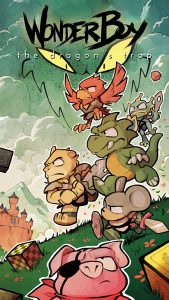 As someone who immensely enjoyed the Wonder Boy games when they were new, I’ve been very skeptical of any use of the license over the years. I’ve loved the Adventure Island games, but admittedly not as much as the originals; however, they’ve been as close as we’ve had to any new installments for years now, so I’ve taken what I could get. Still, I’ve long hoped that Sega would somehow renew the franchise in some fashion. It was a hope that seemed forever dashed when Westone, the group responsible for the series, declared bankruptcy in 2014.
As someone who immensely enjoyed the Wonder Boy games when they were new, I’ve been very skeptical of any use of the license over the years. I’ve loved the Adventure Island games, but admittedly not as much as the originals; however, they’ve been as close as we’ve had to any new installments for years now, so I’ve taken what I could get. Still, I’ve long hoped that Sega would somehow renew the franchise in some fashion. It was a hope that seemed forever dashed when Westone, the group responsible for the series, declared bankruptcy in 2014.
Imagine then, my joy at learning that we’d be getting two games in 2017. Along with the spiritual sequel called Monster Boy and the Cursed Kingdom (which will hopefully relaunch things), it was announced that a remake of the 1989 Master System classic, The Dragon’s Trap. Of course, I was at first filled with glee, but then my cynical side took over, and I began to imagine all kinds of nightmare scenarios filled with butchered sound, generic visual styles, and even… dare I say it… mobile phone touchscreen controls.
To my elation, that is not the case with Lizardcube’s game, titled Wonder Boy: The Dragon’s Trap. Remade for consoles and PC, this is not only a prime example of a retro remake done right, it’s set the bar high enough that others should look to it for inspiration. What’s been done here goes far beyond merely remaining true to the original game and instead serves as evidence for what the Master System version developers might have been thinking of when they crafted that 8-bit masterpiece. It’s likely as close to their original version as one can aspire.
Let me be frank. In my eyes, Wonder Boy III: The Dragon’s Trap remains one of the finest examples of great game design of the 8-bit era. I dare anyone to go back and play it now and tell me it doesn’t hold up. There be some dated aspects (like being sent all the way back to town when you die, even from boss battles), but in general the tale of a young hero out to reverse the curse of the evil Mecha Dragon is a superbly designed title.
The developers of this remake clearly had that in mind and took every precaution during development, which was headed by Omar Cornut, a huge Master System fan. Cornut also developed the Master System emulator Meka, and he knew exactly what he was shooting for here. He went so far as to get the blessings of the series’ creator, Westone co-founder and Wonder Boy mastermind Ryuichi Nishizawa, to sign off on the game – a clear sign that Lizardcube was on the right track from day one (for more development details, read our interview with Cornut, French animator and artist Ben Fiquet, and DotEmu CEO Cyrille Imbert). Everything you remember from the cartridge game is here: all the wonderful level design, the great gameplay, awesome secrets, and the constant urge to explore. There are tons of swords, armors, and shields to find and purchase. As before, many have specific properties that can be used with any character form, such as the dragon shield offering protection from lava.
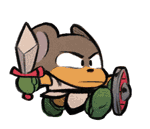 Along with the beautifully done artwork by Fiquet and an exquisite soundtrack by composers Michael Geyre and Romain Gauthier, the gameplay has also been brought into the modern era. For instance, the original game had a little bit of “slipperiness” to it when changing direction that took some getting used to. The remake, running at a buttery-smooth 60 frames-per-second, accommodates for this through extra animation, which start as the turning move begins. It’s a great way to keep the control faithful while maintaining responsiveness.
Along with the beautifully done artwork by Fiquet and an exquisite soundtrack by composers Michael Geyre and Romain Gauthier, the gameplay has also been brought into the modern era. For instance, the original game had a little bit of “slipperiness” to it when changing direction that took some getting used to. The remake, running at a buttery-smooth 60 frames-per-second, accommodates for this through extra animation, which start as the turning move begins. It’s a great way to keep the control faithful while maintaining responsiveness.
Other details include the ability to swap between modern graphics and sound with a simple button press (there’s even an FM sound unit option!), so players can mix and match how they choose. The remake has been so closely done to the original that changing on the fly isn’t jarring at all. Selectable difficulty levels are included, and there’s a bonus gallery packed with artwork, animation samples, music clips, and more. Players can even choose to play as a girl in the beginning; there’s just so much love put into this release.
My only nitpick with this stellar remake is the music. I loved Shinichi Sakamoto’s soundtrack a lot, and I do think that Lizardcube has done a great job, but it seems a bit too subdued in some places. I was hoping for a few faster themes. Granted, this is just a personal preference of mine and not a knock against the soundtrack. Overall, the game’s music is wonderfully composed (you can see the musicians play in unlocked bonus clips), and Lizardcube has been clear that the soundtrack is based on Sakamoto’s instead of simply an updated version of it. With new and expanded themes, it’s definitely worth listening to on its own.
At $19.99, Wonder Boy: The Dragon’s Trap is simply a must-buy title. It’s available on all console and PC (in June), and there is just too good of a game here to ignore. I’m am quite hopeful that this remake will serve as something of a proof-of-concept for a new game, but that remains in the air. Hopefully, we’ll at least see a remake in this fashion of the game’s predecessor, Wonder Boy in Monster Land or either Genesis sequel. Either way, there’s lots more Wonder Boy goodness to work with, and with an official Sega license and a fantastic game engine and assets to work with, we’re as close as ever to it actually happening. Bravo to Lizardcube for perhaps the greatest love letter a Wonder Boy fan could want.
Rating (out of 5): 






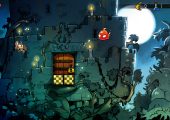

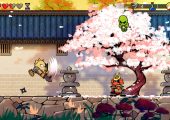

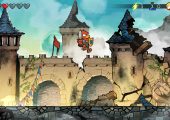
Recent Comments